- Home
- Hammond Innes
Solomons Seal Page 9
Solomons Seal Read online
Page 9
‘That’s got nothing to do with it,’ I told him irritably.
‘No? Then why doesn’t he come out himself, tell me what the problem is to my face?’
‘Rowlinson’s got a business to run in England. He hasn’t the time.’
‘So Munnobungle was just a bloody toy. Is that what you’re saying?’
‘If you like to put it that way.’
‘Jesus! An’ I’ve worked my guts out … ’
We finished our beer in silence and went out to the parking lot. The Fokker Friendship was taxiing now. It took off just as we were driving out of the airport, and seeing its wings glinting silver in the sun as it banked eastward over the sea, I was wishing I were in it, not seated in a dirty utility with a disgruntled man who was worried about the future.
We were headed west, and it was a long, dusty ride, gravel rattling against the mudguards, the last twenty miles all dirt. Having seen the deeds and maps, his reports, all the figures, I thought I knew what Munnobungle would be like. But I was wrong. Nothing, not even Chips’s description of it and the fact that three sheep to the hectare was the best they could do, had prepared me for the aridity of the place. They had had almost a month without rain, which was unusual in winter, and the place was little better than a dustbowl, the scrubland running out to a distant view of purpling hills, and everything hazed in the sun’s glare with the leaves of the eucalypts shimmering to a slight breeze.
I spent three days there, driving more than 100 miles in the Land Rover and covering most of the 60,000-odd hectares. And the more I saw of it, the more I wondered how Chips had ever imagined he could make a profit and who the hell would be fool enough to buy it off him. The percentage rake-off he had promised me faded like a desert mirage. ‘Looks different when we’ve had some rain,’ McIver said hopefully that first evening. And his wife, a quiet, solid woman, added, ‘It’s real beaut then, the grass coming green, and the flowers.’ They had two young kids, a boy and a girl. They were a nice family, and I was sorry for them, hoping that whoever bought the station would let them stay on. They seemed to love the place, something it was hard for me to appreciate, seeing it in a dry spell with nothing growing and the sheep looking gaunt and half-starved.
But by the third day Munnobungle was beginning to get under my skin – the wide skies, the sense of space, and the birds flocking round Deadman’s Hole, a pool in a dry tributary of the Burdekin. It was only 5 miles from the homestead and about the only water I saw on the place. I was riding a horse that day and beginning to understand why Chips had so enjoyed the time he’d spent on the station.
It was my last day there, and that evening I persuaded McIver to drive me over to the hotel at Mushroom Rock on the Burdekin, which was the nearest place I could buy him a beer. I still needed clarification on some of the sale details I had prepared, and I thought it would be easier to discuss them away from the homestead. By then he had become resigned to the inevitable, and we were on reasonably friendly terms, so that when I had got the information I required, I began to tell him about my own problems. I think that was when I first saw him smile. ‘So we’re both of us in the same boat, eh, wondering where the hell we go from here?’
He was no help to me, merely repeating what the estate agents had said, but more colourfully and in greater detail. ‘It’s a tough life, a tough country. No place for a Pommie unless he’s got a helluva lot of capital and doesn’t mind how much he loses.’ When I asked him about the islands, he shrugged. ‘There’s the copper-mining and plantations, that’s about it. Some smart boys, Canadians some of them, are doing well selling to the indigenous population. That’s in PNG, government contracts mainly. It’s what I hear anyway. I never bin there. But I might,’ he added thoughtfully. ‘I might pack it in here and try my luck, ‘cept that I got a family to provide for.’
I told him about the Holland Line then, and asked him whether he knew anything about it, or the family. But he shook his head. ‘There was a Holland on Bougainville became something of a war hero. One of the coast watchers. I remember my father talking about him. Stayed on when all the others had left and fought his own private war.’
‘Was that Colonel Lawrence Holland?’
‘Could be.’ He nodded. ‘He was a colonel, that I do remember.’
‘Did Rowlinson mention a man named Black Holland?’ I asked.
‘Yes, that’s right. He did.’ He frowned. ‘I remember now. He came back full of some story about an aborigine he’d met. Tried to sell him a share in a mine. The Dog Weary gold mine. That was it.’
‘What was his name?’
‘Oh, I don’t recall that. Only the name Black Holland. It seems the abo killed him in a brawl over the ownership of the mine. I remember Rowlinson was full of it at the time, thought it a damned funny story.’ And when I asked him whether the killing had happened locally, he said, ‘Oh, dear, no. Cooktown, I think. Rowlinson had just been to Cooktown to see where Captain Cook had repaired the Endeavour after she’d hit the reef.’
He couldn’t tell me anything more, but when we got back to the homestead and I showed him the letter the stamp dealer in Sydney had given me, he agreed the aborigine’s name might have been Minya Lewis. ‘Reck’n that’s it. Welsh and Cornish miners, they were in on all the gold strikes, and the Palmer River was full of the stuff until the Chinks mined it all out.’
He could tell me nothing more except that there was an amazing graveyard out beyond Cooktown that included a Chinese burial place, also an old Edwardian hotel with frosted glass windows and a large wall painting that included some of the old-timers that still hung around the bar. He had been there only once. Took the wife and kids up there, but it’s a helluva journey unless you fly up with Bush Pilots Airways.’
Had I gone to Cooktown then, I might have had some warning before I got myself involved in the tangled background of the Hollands. As it was, I flew back to Sydney next day knowing nothing about the trail of greed and death that had its origin in the Dog Weary mine, or the relevance of that stamp collection, only that there was probably some connection. I had a window seat, and coming in low over Sydney Harbour Bridge in the late afternoon, the sky clear and the sun just setting, I thought I could see the repair yard where the LCT had been lying. But now there was only a coaster alongside. The plane tilted slightly, giving me a view of the bridge and the whole broad expanse of Port Jackson right out to the Heads. That was when I saw her, a squat little toy of a vessel out beyond Fort Dennison. I thought for a moment I had missed my chance and she had sailed. But as we steadied on our course for the airport on Botany Bay, craning my head, I caught another glimpse of her below the tailplane. I could see the wake then. She wasn’t outward bound. She was heading back into port.
As soon as we landed, I rang the agent. This time I had no trouble, probably because the man who answered was in a hurry to get home. The Perenna had just completed her engine trials. There were still some minor adjustments to be made. These would be carried out tomorrow. She would be taking on cargo Friday morning and sailing for Bougainville that same day. It didn’t give me much time, for I still had the legal side of the Munnobungle sale to deal with, as well as currency and land sale regulations to check. I went straight to my hotel, left my bags and took a taxi to Observatory Park, where I knew I would have a good view of the dock area.
It was a cold, very clear evening, and from the steps above Kent Street I looked across Darling Harbour to wharves thick with shipping and more vessels anchored off in the dark expanse of water. It was some time before I picked her out. She was half hidden by a big container ship, just her bows showing, and then she was completely lost to sight, for the container ship was under way with two tugs in attendance.
When the container ship was clear, I could see her plainly, small and slab-sided among the freighters over towards Peacock Point. There were no taxis, and it was a long walk across Pyrmont Bridge to the dock area and the gate leading on to the wharves. I was almost an hour wandering about under the stars among ships and cran
es and the blank walls of the storage sheds before I was lucky enough to find a launch lying alongside some steps out by Donkey Island. It was taking on the crew of a Japanese freighter anchored off, and the coxs’n, who spoke a few words of English, agreed to drop me off at the LCT. It was just on eight when we left, a stiff breeze blowing up the harbour and all of us huddled under the canopy. He made for his own ship first, and when we were alongside, there was a great sorting out of packages and souvenirs before the crew members finally went chattering like a group of starlings up the gangway. ‘Your ship ex-war?’ the coxs’n asked me, his teeth showing in a grin.
‘Not my ship,’ I told him.
‘You visit?’
I nodded, and he turned the launch towards the LCT, now only three or four cables away. ‘How you get shore?’ he shouted above the sound of the engine and the crash of the bows.
‘They’ll have a boat.’
‘No boat.’
I didn’t say anything, watching as we approached the familiar shape of her. She looked even older than when I had seen her last, the paint flaking from her flat side, the letters HOLLAND LINE showing red and streaked with rust in the glimmer of the shore lights, and her plates all buckled by years of work. And then that name again as we rounded the stern to come alongside under her lee.
No gangway, and no sign of anybody on board, only a light high up in the bridge housing aft. It came from what used to be the wardroom. I hailed her, but there was no reply. A rope ladder lay flat against her side, and I seized hold of it as the launch bumped. ‘You send a signal Yamagata,’ the little coxs’n said, ‘I come take you shore.’
I thanked him, and then the launch was swinging away and I was climbing the rusty side. And when I reached the catwalk, and stood looking down at the empty tank deck with the storm and ramp doors at the far end, it was all so familiar that it was like that first time I had gone aboard an LCT at Helensburgh, a young National Serviceman nervous at the thought of going to sea in such a strange craft.
‘You, what you like?’
I turned to find a man in thin blue trousers and a heavy sweater standing below the bridge housing. He was very black with a great mop of frizzy black hair. ‘Is the Captain on board?’ I asked him.
He stared at me, the whites of his eyes showing, and there was a long silence. ‘You like to see him?’
‘Where is he? In the wardroom?’
‘What you want him for?’
I hesitated. ‘Is his name Holland?’
‘He not seeing anybody.’
‘Tell him I have news of his sister.’ I had moved along the catwalk and was now quite close to the man. He was shivering slightly, and the glossy smoothness of his black skin had a blue tinge as though he had been dipped in indigo. ‘You’ll get cold out here,’ I said, moving past him towards the bridge ladder.
‘Okay. I take you.’
‘Don’t bother. I know the way.’ I went up the ladder to the bridge wing and slid back the door to the wheelhouse. It was dark inside, only the glow of the shore lights to show me the dim outline of the wheel and the engine-room telegraph. It was very quiet, no sound of movement or voices, not even a radio, and the hum of the ship’s generator muted to a gentle persistent murmur deep down below me. I went through into the passage leading aft, past the captain’s cabin and the signals office with its radio equipment. Light showed in the heat cracks of the wardroom door, and I pushed it open.
The layout hadn’t changed, a black grease-stained leather settle around two sides of the mess table, some chairs and the inevitable ship photographs and Service plaques on the walls. The mess table had a chart spread half across it, and there were books open, one of them an Admiralty Pilot, and beside it a sheet of paper with some notes. There was also a half-empty bottle of whisky and a china jug with the lip broken. All this I took in at a glance, my mind slipping back twenty years and my eyes fastening on the man slumped at the far end of the settle under the porthole, his legs up and his head leaning back against the corner. He had dark hair, almost black, a square freckled face, very sallow with deep lines creasing the forehead and his mouth hung slightly open.
He looked ill and tired, and I thought for a moment he had fallen into a drunken coma. But then his eyes opened, staring at me wide with shock. Suddenly he sat up, a quick startled movement. ‘Who are you?’
‘You’re the Captain, are you?’ I asked him.
He nodded slowly, his eyes still wide and that startled, almost frightened look. I told him my name, but he didn’t seem to take it in. ‘Who sen’ you?’ His voice was soft, a little slurred. ‘Wha’ you want?’
He wasn’t ill. He was just scared. I could literally smell his fear, the nerve twitching a muscle in his cheek, his self-control almost gone.
‘It’s all right,’ I said, trying to reassure him. ‘I just came to see if you had room for a passenger. They told me you’d be sailing on Friday as soon as you had taken on cargo.’ I was talking fast, trying to give him time to accustom himself to my presence. ‘I’m from England, on business, but I’ve got over a month to kill and I thought—’
‘Who told you I’d be sailing on Friday?’
‘The agents.’
‘An’ you wan’ come with me, on this ship?’ The creases on his forehead deepened as he forced his brain to concentrate. ‘Why? Who put you up to this?’
‘Nobody,’ I said. ‘I’ve just told you, I’ve time to kill and I’ve never been to Bougainville or the Solomons. I’d like to sail with you, that’s all.’ And then, because he bore no resemblance to Perenna Holland and I wanted to make doubly sure of his identity, I asked him if he were the owner as well as the captain.
‘Yes, I own this ship.’ He was staring at me, breathing hard. ‘Didn’t you know that? Didn’t they tell you?’
‘You’re Jona Holland, then.’
‘Who told you that? My name’s Jonathan Holland. Nobody calls me Jona, ‘cept – ‘cept my sister.’ He sounded confused, fear giving way to resentment. ‘I don’t know who you are, what you’re doing here. I’ve got things to consider – decisions – must think clearly, work it out.’ He pushed his hand up through his hair, staring with glazed eyes at the bottle. ‘Tomorrow night and the nex’ night and the nex’. No sleep. Five nights and then—’ He looked up at me suddenly. ‘You know Perenna?’
‘I’ve met her.’
‘In Suffolk?’
‘Yes, at the house in Aldeburgh.’ And I started to explain the circumstances, but he wasn’t listening. Even when I told him she wasn’t there any more, he didn’t seem to take it in, muttering to himself, ‘She doesn’t understand. About money, I mean. The difficulties—’ He checked himself, staring at me with a surprised look as though suddenly conscious of my presence. ‘Sit down. Have a drink.’ He waved vaguely to a chair. ‘Strange girl, Perenna. Tough. She won’t stay there, will she? Not now she’s put him in a home. Did she tell you she’d killed a man? She was with Mother in the kitchen when they burst in, an’ she fought them off with a meat cleaver. Killed one and wounded another before they—’ His eyes were wide open, reliving the scene. ‘She was only seventeen. Blood everywhere. Always remember it. Terrible sham’les.’ I thought for a moment he was going to burst into tears, but then he pulled himself together, a conscious effort. ‘Glasses in cupboard. Wha’ d’you say your name was?’
‘Slingsby,’ I said. ‘Roy Slingsby.’ I got a glass and poured myself a drink, appalled at the scene, at his vivid recollection of it. ‘What caused the natives to behave so violently?’ I asked.
‘Cargo,’ he muttered darkly. ‘Bloo’y Cargo. They go crazy.’ He shook himself as though to get rid of the memory. ‘Why d’you wan’ to go to Bougainville anyway?’ He pronounced it Boganville.
‘I’ve always wanted to visit a Pacific island.’
‘Coral beaches, white sands, blue sea, blue sky, eh?’ He laughed, but on a high, tense note. ‘Bougainville’s not like that. Just rain and mountains and rainforests, and copper, bloo’y copper. C
opper and gold. Gone to their silly heads.’ He reached for the bottle, looking round vaguely for his glass, which was lying on the floor. I got it for him, and he mumbled his thanks. Then, suddenly suspicious again: ‘Who you going to see on Bougainville?’
‘Nobody. I don’t know anybody there.’
‘Bloo’y liar.’ The bottle rattled against the glass as he poured the whisky. ‘Nobody goes to Bougainville without a reason.’ He looked up at me, his eyes focusing, his forehead creased with the effort. ‘You going to make trouble, start organising things?’
I hesitated, but his behaviour was so odd … ‘Are you expecting trouble?’ I asked. ‘Is that why you’re scared?’
‘Scared?’
‘Yes, scared. You’re scared of something.’
He shook his head vaguely. ‘Drunk too much,’ he muttered, pushing the glass away. ‘Copper an’ gold. They think it’s Cargo. You know about Cargo?’
It seemed a pointless question, but when I said, Yes, of course I did, he got very excited. ‘You’ve been briefed. They’ve briefed you, and now you want me—’
‘Look,’ I said, ‘I’m just an estate agent acting for a friend of mine in England. I know nothing about Bougainville, only that you operate out of the Buka Passage.’ I told him about Munnobungle then and having to wait until August 22 for the sale. ‘I’ve time to kill, and this seemed a good way of doing it.’
‘You mean just a tourist trip. To Bougainville!’ He said it incredulously, glaring at me, his bloodshot eyes still doubtful. ‘Why don’t you fly, then?’
‘I like the sea.’
‘An old bucket like this? If we got another southerly buster, you’d be sick as a dog and so bloo’y frightened—’
‘I know what these ships are like in a blow.’
He didn’t seem to hear me. ‘She rolls and rattles and flops around like a limp sheet of tin. One day she’ll break her bloo’y back.’
‘You don’t have to tell me. I’ve sailed on LCTs before.’ And I added, ‘Maybe on this one. I served in three of them.’

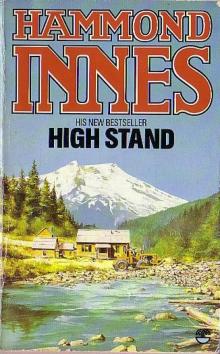 High Stand
High Stand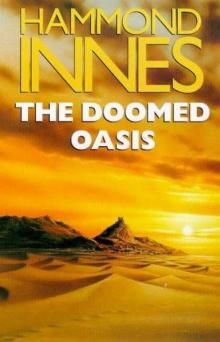 The Doomed Oasis
The Doomed Oasis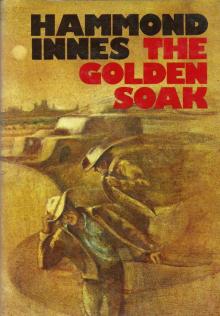 Golden Soak
Golden Soak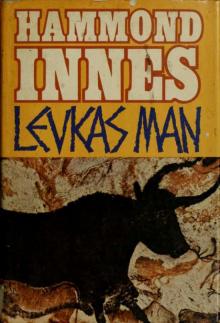 Levkas Man (Mystery)
Levkas Man (Mystery)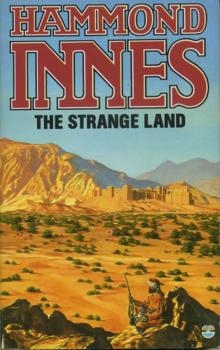 The Strange Land
The Strange Land Dead and Alive
Dead and Alive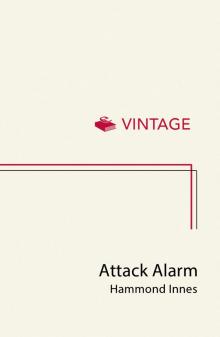 Attack Alarm
Attack Alarm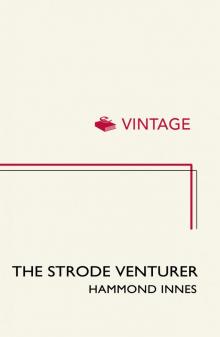 The Strode Venturer
The Strode Venturer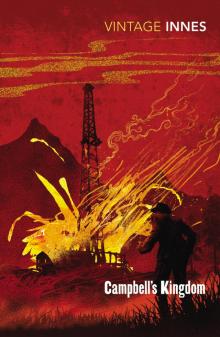 Campbell's Kingdom
Campbell's Kingdom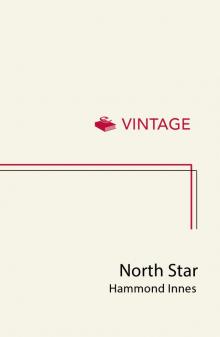 North Star
North Star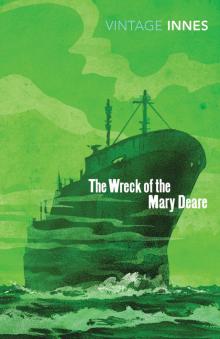 The Wreck of the Mary Deare
The Wreck of the Mary Deare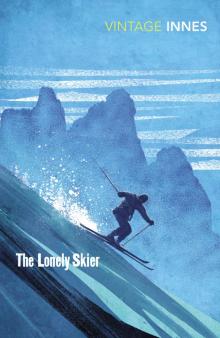 The Lonely Skier
The Lonely Skier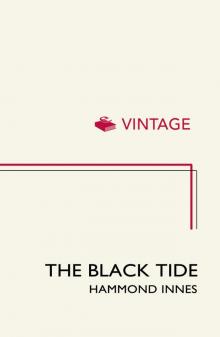 The Black Tide
The Black Tide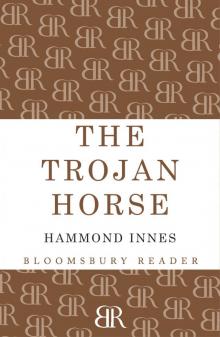 The Trojan Horse
The Trojan Horse Medusa
Medusa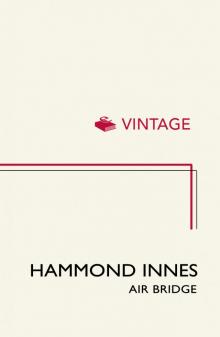 Air Bridge
Air Bridge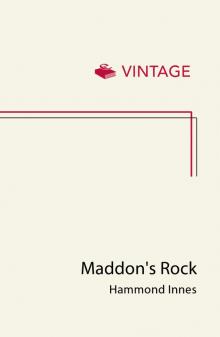 Maddon's Rock
Maddon's Rock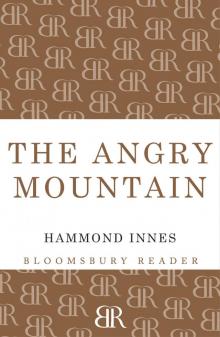 The Angry Mountain
The Angry Mountain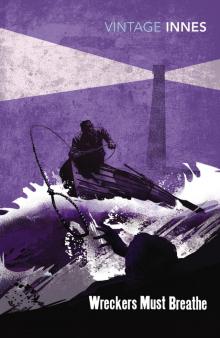 Wreckers Must Breathe
Wreckers Must Breathe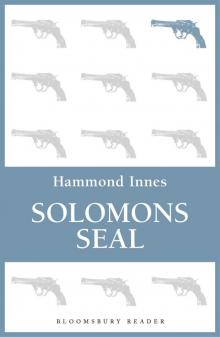 Solomons Seal
Solomons Seal The White South
The White South